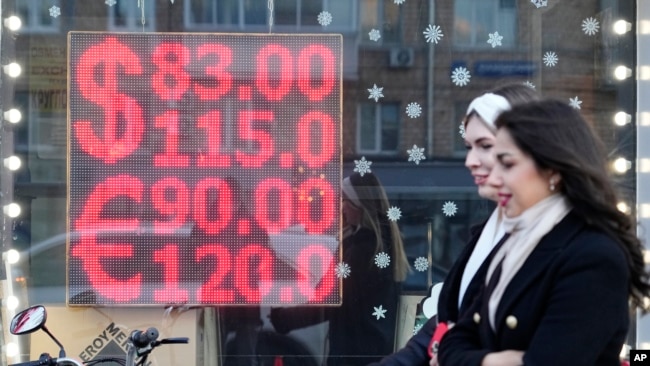今、世界は混沌としています。
ロシアによるウクライナ侵攻は、エネルギーに端を発し世界経済に大きな影響を及ぼし始めています。
コロナで痛んだところに追い討ちを駆ける形で、心にも壮絶な痛みを感じています。
今日もVOAで英語を学び、世界の今を見つめましょう!!
ロシアによるウクライナ侵攻が世界に及ぼす影響(和訳)
The Worldwide Effects of Russia’s Invasion of Ukraine
March 06, 2022
ロシアのウクライナ攻撃は、ロシアを罰することを目的とした強力な国際的行動をもたらしました。しかし、ロシアへの規制は他国への圧力にもなっています。
クレイ・ローリー氏は、銀行の業界団体である国際金融研究所の幹部です。「予測できない影響があることは分かっています。」と彼は言います。
ほとんどの主要経済国は、ロシアとの貿易が限られています。米国にとっては、貿易総額の0.5%。中国の場合は、約2.4%です。
このため、オックスフォード・エコノミクスの主席エコノミスト、アダム・スレーター氏は、今年の世界のGDP、つまり経済総生産は0.2パーセントしか落ちないと予測しています。米国、中国、そしてほとんどの発展途上国への影響は限定的なものになるはずだといいます。
しかし、ロシアは石油、天然ガス、金属などの非常に重要な供給国です。コモディティと呼ばれる重要な材料の価格上昇は、世界中に問題を引き起こす可能性があります。
経済的制約
米国をはじめとする西側諸国は、ロシアを主要経済国として強い制裁の対象にしています。ロシアの一部の銀行は、国際決済システム SWIFT から排除されました。ロシアへのハイテク製品の輸出は制限されています。そして、ロシアは外貨準備高、つまり輸出の支払いに使うお金を使う能力を強く制限されてきました。
High Frequency Economics社のチーフエコノミストであるカール・ワインバーグ氏は、「世界は — あるいはその大部分 — は、ロシアを経済的に包囲している」と書いています。
その結果、ロシアの通貨ルーブルの交換価値は月曜日に記録的な低水準に落ち込みました。多くのロシア人がお金を引き出すために銀行の機械に列を作り、ロシアの銀行システムに打撃を与えました。
ワシントンDCの国際金融研究所は、ロシア経済が今年10%以上縮小すると予想しています。
オックスフォード・エコノミクスは、以前の戦争の証拠に基づき、ウクライナ経済は50〜60%縮小する可能性があると述べています。
ヨーロッパにとって厳しい時代
ロシアからのエネルギーに依存するヨーロッパ経済は、今、大きなリスクにさらされています。
天然ガス価格は開戦後20%上昇しましたが、2021年に入ってからは6倍になっています。
ガス価格の高騰はインフレを助長し、欧州の人々は暖房費を多く支払っています。その結果、家計の支出は減り、COVID-19パンデミック後の景気回復への期待も小さくなっています。
天然ガスを使う産業、例えば肥料メーカーは減産を余儀なくされています。農家は機械を動かすため、肥料を買うために、より多くのお金を払っています。ドイツ経済は、2022年の最初の3カ月までにリセッションに直面する可能性があります。
需要に見合った供給先を探す
COVID-19の流行が緩和されるにつれ、世界中の企業は需要に見合うだけの商品を確保しようとしています。これは、品不足、出荷の遅れ、価格の上昇を意味しています。
ロシアとウクライナの産業の混乱は、通常の状態への復帰を遅らせる可能性があります。
ロシアとウクライナは合わせて世界のチタンの13%を供給しており、これは航空機の製造に使用されています。自動車、携帯電話、歯の詰め物に使われるパラジウムは、ロシアとウクライナで世界の30パーセントを供給している、とマーク・ザンディ氏は言います。彼はムーディーズ・アナリティックスのチーフエコノミストです。
近隣のトラブル
紛争と制裁は、ウズベキスタンやタジキスタンからのロシアの出稼ぎ労働者にも打撃を与えることでしょう。これらの労働者の家族は、送金と呼ばれるロシアからの仕送りに頼っています。
2020年、ロシアからウズベキスタンへの送金は39億ドル、キルギスへの送金は20億ドルだったと、ロシア中央銀行は述べています。
ギャビン・ヘルフ氏は米国平和研究所の中央アジアの専門家です。今週、彼は、ロシアの労働市場の崩壊は、中央アジアに強い影響を与えるだろうと書いています。
物価の上昇
ウクライナ戦争は、米国連邦準備制度理事会(FRB)をはじめとする中央銀行がインフレ率の上昇に対処している最中に起きています。
1月の米国の消費者物価は前年比7.5%上昇し、1982年以来最大の伸びとなりました。ヨーロッパでは、ユーロを通貨として使用している19カ国のインフレ率は前年同期比で5.8%に上昇し、記録を更新しました。
今、物価はさらに上昇する可能性があります。ザンディ氏は、ロシアとウクライナは世界の石油の12%、天然ガスの17%を生産していると指摘しています。
インフレに対抗するために、アメリカの中央銀行、略してFRBは2週間後に開かれる会合で、管理している金利を引き上げると予想されています。欧州中央銀行もパンデミック支援策を徐々に撤回しています。
しかし、中央銀行は、インフレリスクの高まりとウクライナ危機が世界経済に与える影響とを比較検討しなければなりません。
The Worldwide Effects of Russia’s Invasion of Ukraine
Russia’s attack on Ukraine has resulted in strong, international actions aimed at punishing Russia. But restrictions on Russia also put pressure on other countries.
Clay Lowery is an official at the Institute of International Finance, a trade group of banks. “We know there are consequences that we cannot predict," he said.
Most major economies have only limited trade with Russia. For the United States, it is 0.5 percent of total trade. For China, it is around 2.4 percent.
For this reason, Adam Slater, lead economist at Oxford Economics predicts only a 0.2 percent drop in the world’s GDP, or total economic production, this year. He said the effects on the U.S., China and most developing countries should be limited.
However, Russia is a very important supplier of oil, natural gas, and metals. Higher prices on important materials, known as commodities, could cause problems around the world.
Economic restrictions
The United States and other Western nations have targeted Russia with strong sanctions for a major economy. Some Russian banks have been removed from the SWIFT international payment system. High technology exports to Russia have been limited. And Russia’s ability to use its foreign currency reserves, money it uses to pay for exports, has been strongly restricted.
“The world — or most of it anyway — is laying economic siege to Russia,” wrote Carl Weinberg, chief economist at High Frequency Economics.
As a result, the exchange value of Russia’s money, the ruble, dropped to a record low on Monday. Many Russians lined up at banking machines to withdraw money, hurting Russia’s banking system.
The Institute of International Finance in Washington, D.C., expects the Russian economy to shrink by more than 10 percent this year.
Oxford Economics said, based on evidence from earlier wars, the Ukrainian economy could shrink by 50 to 60 percent.
Hard times for Europe
With its dependence on energy from Russia, Europe’s economy is now at great risk.
Natural gas prices increased 20 percent after the war started, but are six times higher than they were at the start of 2021.
High gas prices are feeding inflation, and Europeans are paying more for heating. The result is that households have less money to spend, and hopes for an economic recovery after the COVID-19 pandemic have decreased.
Industries that use natural gas, like fertilizer makers, have to cut production. Farmers are paying more to run machinery and buy fertilizer. Germany’s economy could be facing a recession by the first three months of 2022.
Finding supplies to meet demand
Companies around the world are trying to find enough goods to meet demand as the COVID-19 pandemic eases. This has meant shortages, shipping delays and higher prices.
Disruptions to Russian and Ukrainian industries could delay any return to normal conditions.
Russia and Ukraine together supply 13 percent of the world’s titanium, which is used to make airplanes. The two provide 30 percent of the world’s palladium, which goes into cars, cellphones and dental fillings, said Mark Zandi. He is chief economist at Moody’s Analytics.
Trouble in the neighborhood
The conflict and sanctions will also hurt Russia’s migrant workers from Uzbekistan and Tajikistan. Those workers’ families depend on money sent home from Russia known as remittances.
In 2020, remittances from Russia to Uzbekistan were $3.9 billion and to Kyrgyzstan $2 billion, says the Russian central bank.
Gavin Helf is an expert on Central Asia for the U.S. Institute of Peace. This week, he wrote that the collapse of the labor market in Russia will have a strong effect on Central Asia.
Rising prices
The Ukraine war takes place as the U.S. Federal Reserve and other central banks are dealing with rising inflation.
In January, U.S. consumer prices rose 7.5 percent from a year earlier, the biggest jump since 1982. In Europe, inflation increased to a record 5.8 percent compared with the same time a year earlier for the 19 countries that use the euro as money.
Now, prices could go even higher. Zandi noted that Russia and Ukraine produce 12 percent of the world’s oil and 17 percent of its natural gas.
To combat inflation, the U.S. central bank, or Fed for short, is expected to raise interest rates it controls when it meets in two weeks. The European Central Bank also is slowly withdrawing its pandemic aid efforts.
However, central bankers must weigh the growing risks of inflation against the Ukraine crisis’s effects on the world’s economies.
Words in This Story
consequences –n.(pl.) something that happens as a result of a particular action or set of conditions
sanctions – n.(pl.) actions taken to force a country to obey international law by limiting or stopping trade or cutting economic aid
siege –n. a situation in which soldiers or police officers surround a city, or building, in order to try to take control of it
disruption –n. something that prevents things from operating in a normal way; something that interrupts normal activities
